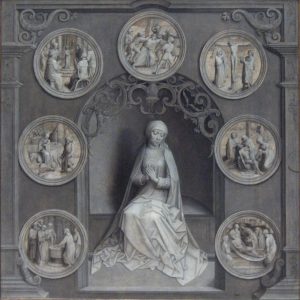
Feast of the Seven Sorrows of the Blessed Virgin Mary
[Sermon of Saint Bernard, Abbot and Doctor of the Church]
The martyrdom of the Virgin is set before us both in Simeon’s prophecy and in the narrative of the Lord’s Passion. “This Child is destined,” the holy elderly man said of

Linkerluik van een diptiek van O.-L.-Vrouw der Zeven Weeën bestemd voor de Onze-Lieve-Vrouwekerk in Brugge
By Adriaen Isenbrandt – Own work, Georges Jansoone (JoJan), 2009-06-20, Public Domain, https://commons.wikimedia.org/w/index.php?curid=7195251
the Child Jesus, “for a sign that
shall be contradicted; and thine own soul,” he said to Mary, “a sword shall pierce.” And in truth, O Blessed Mother, thy soul was pierced. Unless the sword had passed
through thy soul, it would not have pierced the Flesh of thy Son. And after thy Jesus had sent forth His spirit, clearly the cruel lance that opened His side could not reach His soul, but it pierced thine. For His soul was no longer there, but thine could not be torn away.
The full force of sorrow pierced thy soul, therefore, so that we rightly call thee more than Martyr, thou in whom the love of compassion went far beyond the feeling of bodily suffering. And was not that word more than a sword to thee, indeed piercing thy soul and reaching even to the division of soul and spirit, “Woman, behold thy son”? What a change! John is  given to thee instead of Jesus, the servant for the Lord, the disciple for the Master, the son of Zebedee for the Son of God, a mere man for the true God. How should thy most affectionate soul not have been pierced at hearing this, when even our hearts that are like stone or iron are torn merely by recalling it?
given to thee instead of Jesus, the servant for the Lord, the disciple for the Master, the son of Zebedee for the Son of God, a mere man for the true God. How should thy most affectionate soul not have been pierced at hearing this, when even our hearts that are like stone or iron are torn merely by recalling it?
Do not wonder, brethren, that Mary is called a Martyr in soul. We may wonder, if we do not remember the words of Saint Paul saying that among the greatest crimes of the Gentiles was that they were without affection. Far is this from the Heart of Mary, and it should be far from her servants. But perhaps someone will say, “Did she not know He was to die?” She did. “Did she not still have hope that He would soon rise again?” She faithfully hoped for it. “In spite of this, did she sorrow over the Crucified?” She sorrowed greatly. What kind of man are you, O brother, and what kind of wisdom is this to find Mary’s com-passion more wonderful than the Passion of Mary’s Son? He could die the death of the Body; could she not die with Him in her Heart? Love did the first, love greater than any man ever had; and love also did the second, a love like none other save His.
Related Libraries
There are no related libraries
Related Articles
There are no related articles